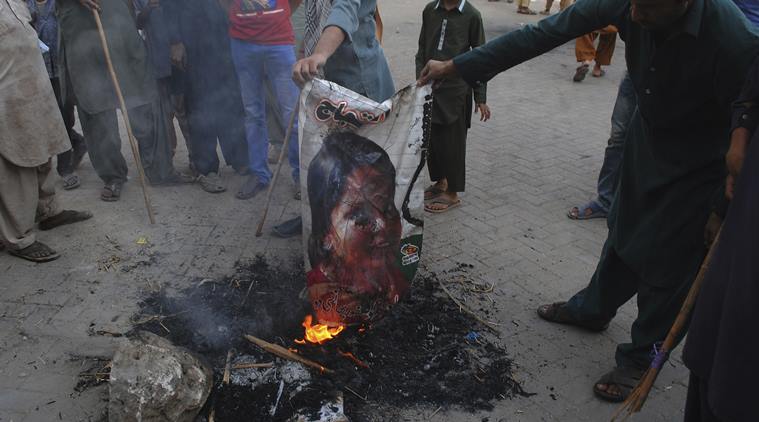 Pakistani protesters burn a poster image of Christian woman Asia Bibi, who has spent eight-years on death row accused of blasphemy and acquitted by a Supreme Court, in Hyderabad, Pakistan, Thursday, Nov. 1, 2018. (AP Photo/Pervez Masih)
Pakistani protesters burn a poster image of Christian woman Asia Bibi, who has spent eight-years on death row accused of blasphemy and acquitted by a Supreme Court, in Hyderabad, Pakistan, Thursday, Nov. 1, 2018. (AP Photo/Pervez Masih)
Blasphemy and the legal and moral contradictions it appears to hold through its existence in modern state of Pakistan has been at the centerstage of the debate in that country. Initially, after the Supreme Court of Pakistan acquitted Asia Bibi on charges of blasphemy, Prime Minister Imran Khan welcomed the verdict, and made the right liberal statements on the issue. But as protests have gathered steam, he has negotiated with the agitators. According to Dawn in its editorial on November 3, “After three days of protests, destruction of property, closure of roads and highways and massive disruptions to the daily life of citizens, the government appears to have found a solution: agree to to the protesters’ demands.”
“Perhaps,” it conjectures, “Prime Minister Imran Khan and his government decided that, despite Mr Khan’s nationally televised address this week, a hands-off approach that allowed the protesters to vent their rage would allow the country to return to a semblance of normality”. Giving in to such elements over the rule of law, of the government not being seen to bend to the most retrograde of views, makes Pakistan seem “like a country with no real leadership while chaos and anarchy spread in the streets once again,” according to the editorial.
Pakistan today
Cyril Almeida, a journalist with Dawn, talks about the “third phase” of nationalism and state-building that Pakistan is undergoing. The first was in the immediate aftermath of independence and Partition; the second, which began in the 1970s, was defined by three events: “The Zia coup and his Islamisation drive; the Iranian revolution just as petrodollars were turbocharging regional politics; and the Soviet invasion of Afghanistan under the Cold War overhang.”
The third phase began with the second Afghan war, “the al Qaeda effect” and Pakistan being a theatre of the war on terror. This phase is still unfolding. After discussing its contradictions, the essence of the third phase for Almeida boils down to this: “The extremist in the ascendant is also linked to what’s happened to the country and what the state has done in semi-response over the past decade and a half. Ultra-sensitivities, personal predicaments and a threatening landscape prevent from spelling that out, too. But the original sectarian divide in phase two morphed into a fierce militancy on one side of the majority sect that has seemingly triggered a backlash from another side of the majority sect that is demanding more public oxygen and a greater say in the national discourse.”
This divide is manifested, sadly, in the fate of Asia Bibi.
Lanka in crisis
Since October 26 and the “constitutional coup” by Sri Lanka President Maithripala Sirisena, there has been “no good news” according to the November 3 editorial in The Island. After recounting the news, the editorial’s thrust appears to be that the current constitutional crisis can be resolved only by the country’s apex court.
It says: “Despite the array of conflicting opinions and interpretations of the country’s 1978 constitution and its 19th Amendment enacted after the Sirisena- Wickremesinghe government took office in 2015, none of the protagonists has chosen to go to the Supreme Court and seek a final ruling. It is the Supreme Court that must make the final determination on Constitutional imbroglios — and this is undoubtedly one. We are told that Wickremesinghe who insists that this is a matter that must be resolved by parliament, where he is confident of the majority, fears that it will take around eight weeks for the court to reach a final decision. Seeing the government busily chipping away at his majority, using the resources of the state including the conferring of public office as an inducement for defecting, he appears to have ruled out that route of seeking redress.”
But “while Ranil Wickremesinghe wants to play (and win) a numbers game in parliament” Mahinda Rajapaksa is looking for a parliamentary election which cannot be held till 2020 “because the president is constitutionally debarred from dissolving parliament until four and a half years after its first sitting”.
Despite its melancholy tone, the editorial doesn’t locate a silver lining in the events since October 26: “Save for the single crisis related shooting of a Ceylon Petroleum Corporation employee, there has been no bloodletting. The powers that be chose not to try to force Wickremesinghe out of ‘Temple Trees’ by shutting off water and electricity to the prime minister’s official residence, also used as an office, that had been advocated. The military and the police have also not taken sides.”